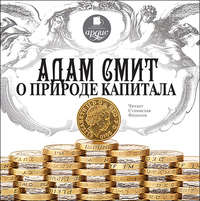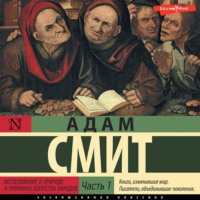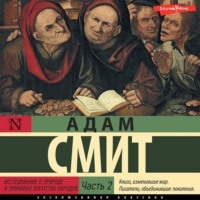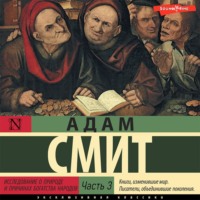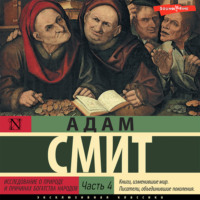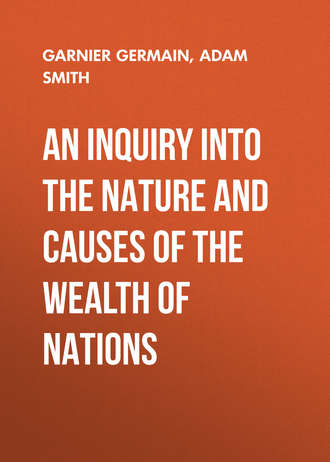 полная версия
полная версияAn Inquiry Into the Nature and Causes of the Wealth of Nations
Neither are the profits of the undertakers of silver mines commonly very great in Peru. The same most respectable and well-informed authors acquaint us, that when any person undertakes to work a new mine in Peru, he is universally looked upon as a man destined to bankruptcy and ruin, and is upon that account shunned and avoided by every body. – Mining, it seems, is considered there in the same light as here, as a lottery, in which the prizes do not compensate the blanks, though the greatness of some tempts many adventurers to throw away their fortunes in such unprosperous projects.
As the sovereign, however, derives a considerable part of his revenue from the produce of silver mines, the law in Peru gives every possible encouragement to the discovery and working of new ones. Whoever discovers a new mine, is entitled to measure off two hundred and forty-six feet in length, according to what he supposes to be the direction of the vein, and half as much in breadth. He becomes proprietor of this portion of the mine, and can work it without paying any acknowledgment to the landlord. The interest of the duke of Cornwall has given occasion to a regulation nearly of the same kind in that ancient dutchy. In waste and uninclosed lands, any person who discovers a tin mine may mark out its limits to a certain extent, which is called bounding a mine. The bounder becomes the real proprietor of the mine, and may either work it himself, or give it in lease to another, without the consent of the owner of the land, to whom, however, a very small acknowledgment must be paid upon working it. In both regulations, the sacred rights of private property are sacrificed to the supposed interests of public revenue.
The same encouragement is given in Peru to the discovery and working of new gold mines; and in gold the king's tax amounts only to a twentieth part of the standard rental. It was once a fifth, and afterwards a tenth, as in silver; but it was found that the work could not bear even the lowest of these two taxes. If it is rare, however, say the same authors, Frezier and Ulloa, to find a person who has made his fortune by a silver, it is still much rarer to find one who has done so by a gold mine. This twentieth part seems to be the whole rent which is paid by the greater part of the gold mines of Chili and Peru. Gold, too, is much more liable to be smuggled than even silver; not only on account of the superior value of the metal in proportion to its bulk, but on account of the peculiar way in which nature produces it. Silver is very seldom found virgin, but, like most other metals, is generally mineralized with some other body, from which it is impossible to separate it in such quantities as will pay for the expense, but by a very laborious and tedious operation, which cannot well be carried on but in work-houses erected for the purpose, and, therefore, exposed to the inspection of the king's officers. Gold, on the contrary, is almost always found virgin. It is sometimes found in pieces of some bulk; and, even when mixed, in small and almost insensible particles, with sand, earth, and other extraneous bodies, it can be separated from them by a very short and simple operation, which can be carried on in any private house by any body who is possessed of a small quantity of mercury. If the king's tax, therefore, is but ill paid upon silver, it is likely to be much worse paid upon gold; and rent must make a much smaller part of the price of gold than that of silver.
The lowest price at which the precious metals can be sold, or the smallest quantity of other goods for which they can be exchanged, during any considerable time, is regulated by the same principles which fix the lowest ordinary price of all other goods. The stock which must commonly be employed, the food, clothes, and lodging, which must commonly be consumed in bringing them from the mine to the market, determine it. It must at least be sufficient to replace that stock, with the ordinary profits.
Their highest price, however, seems not to be necessarily determined by any thing but the actual scarcity or plenty of these metals themselves. It is not determined by that of any other commodity, in the same manner as the price of coals is by that of wood, beyond which no scarcity can ever raise it. Increase the scarcity of gold to a certain degree, and the smallest bit of it may become more precious than a diamond, and exchange for a greater quantity of other goods.
The demand for those metals arises partly from their utility, and partly from their beauty. If you except iron, they are more useful than, perhaps, any other metal. As they are less liable to rust and impurity, they can more easily be kept clean; and the utensils, either of the table or the kitchen, are often, upon that account, more agreeable when made of them. A silver boiler is more cleanly than a lead, copper, or tin one; and the same quality would render a gold boiler still better than a silver one. Their principal merit, however, arises from their beauty, which renders them peculiarly fit for the ornaments of dress and furniture. No paint or dye can give so splendid a colour as gilding. The merit of their beauty is greatly enhanced by their scarcity. With the greater part of rich people, the chief enjoyment of riches consists in the parade of riches; which, in their eye, is never so complete as when they appear to possess those decisive marks of opulence which nobody can possess but themselves. In their eyes, the merit of an object, which is in any degree either useful or beautiful, is greatly enhanced by its scarcity, or by the great labour which it requires to collect any considerable quantity of it; a labour which nobody can afford to pay but themselves. Such objects they are willing to purchase at a higher price than things much more beautiful and useful, but more common. These qualities of utility, beauty, and scarcity, are the original foundation of the high price of those metals, or of the great quantity of other goods for which they can everywhere be exchanged. This value was antecedent to, and independent of their being employed as coin, and was the quality which fitted them for that employment. That employment, however, by occasioning a new demand, and by diminishing the quantity which could be employed in any other way, may have afterwards contributed to keep up or increase their value.
The demand for the precious stones arises altogether from their beauty. They are of no use but as ornaments; and the merit of their beauty is greatly enhanced by their scarcity, or by the difficulty and expense of getting them from the mine. Wages and profit accordingly make up, upon most occasions, almost the whole of the high price. Rent comes in but for a very small share, frequently for no share; and the most fertile mines only afford any considerable rent. When Tavernier, a jeweller, visited the diamond mines of Golconda and Visiapour, he was informed that the sovereign of the country, for whose benefit they were wrought, had ordered all of them to be shut up except those which yielded the largest and finest stones. The other, it seems, were to the proprietor not worth the working.
As the prices, both of the precious metals and of the precious stones, is regulated all over the world by their price at the most fertile mine in it, the rent which a mine of either can afford to its proprietor is in proportion, not to its absolute, but to what may be called its relative fertility, or to its superiority over other mines of the same kind. If new mines were discovered, as much superior to those of Potosi, as they were superior to those of Europe, the value of silver might be so much degraded as to render even the mines of Potosi not worth the working. Before the discovery of the Spanish West Indies, the most fertile mines in Europe may have afforded as great a rent to their proprietors as the richest mines in Peru do at present. Though the quantity of silver was much less, it might have exchanged for an equal quantity of other goods, and the proprietor's share might have enabled him to purchase or command an equal quantity either of labour or of commodities.
The value, both of the product and of the rent, the real revenue which they afforded, both to the public and to the proprietor, might have been the same.
The most abundant mines, either of the precious metals, or of the precious stones, could add little to the wealth of the world. A produce, of which the value is principally derived from its scarcity, is necessarily degraded by its abundance. A service of plate, and the other frivolous ornaments of dress and furniture, could be purchased for a smaller quantity of labour, or for a smaller quantity of commodities; and in this would consist the sole advantage which the world could derive from that abundance.
It is otherwise in estates above ground. The value, both of their produce and of their rent, is in proportion to their absolute, and not to their relative fertility. The land which produces certain quantity of food, clothes, and lodging, can always feed, clothe, and lodge, a certain number of people; and whatever may be the proportion of the landlord, it will always give him a proportionable command of the labour of those people, and of the commodities with which that labour can supply him. The value of the most barren land is not diminished by the neighbourhood of the most fertile. On the contrary, it is generally increased by it. The great number of people maintained by the fertile lands afford a market to many parts of the produce of the barren, which they could never have found among those whom their own produce could maintain.
Whatever increases the fertility of land in producing food, increases not only the value of the lands upon which the improvement is bestowed, but contributes likewise to increase that or many other lands, by creating a new demand for their produce. That abundance of food, of which, in consequence of the improvement of land, many people have the disposal beyond what they themselves can consume, is the great cause of the demand, both for the precious metals and the precious stones, as well as for every other conveniency and ornament of dress, lodging, household furniture, and equipage. Food not only constitutes the principal part of the riches of the world, but it is the abundance of food which gives the principal part of their value to many other sorts of riches. The poor inhabitants of Cuba and St. Domingo, when they were first discovered by the Spaniards, used to wear little bits of gold as ornaments in their hair and other parts of their dress. They seemed to value them as we would do any little pebbles of somewhat more than ordinary beauty, and to consider them as just worth the picking up, but not worth the refusing to any body who asked them. They gave them to their new guests at the first request, without seeming to think that they had made them any very valuable present. They were astonished to observe the rage of the Spaniards to obtain them; and had no notion that there could anywhere be a country in which many people had the disposal of so great a superfluity of food; so scanty always among themselves, that, for a very small quantity of those glittering baubles, they would willingly give as much as might maintain a whole family for many years. Could they have been made to understand this, the passion of the Spaniards would not have surprised them.
Part III. —Of the variations in the Proportion between the respective Values of that sort of Produce which always affords Rent, and of that which sometimes does, and sometimes does not, afford Rent
The increasing abundance of food, in consequence of the increasing improvement and cultivation, must necessarily increase the demand for every part of the produce of land which is not food, and which can be applied either to use or to ornament. In the whole progress of improvement, it might, therefore, be expected there should be only one variation in the comparative values of those two different sorts of produce. The value of that sort which sometimes does, and sometimes does not afford rent, should constantly rise in proportion to that which always affords some rent. As art and industry advance, the materials of clothing and lodging, the useful fossils and materials of the earth, the precious metals and the precious stones, should gradually come to be more and more in demand, should gradually exchange for a greater and a greater quantity of food; or, in other words, should gradually become dearer and dearer. This, accordingly, has been the case with most of these things upon most occasions, and would have been the case with all of them upon all occasions, if particular accidents had not, upon some occasions, increased the supply of some of them in a still greater proportion than the demand.
The value of a free-stone quarry, for example, will necessarily increase with the increasing improvement and population of the country round about it, especially if it should be the only one in the neighbourhood. But the value of a silver mine, even though there should not be another within a thousand miles of it, will not necessarily increase with the improvement of the country in which it is situated. The market for the produce of a free-stone quarry can seldom extend more than a few miles round about it, and the demand must generally be in proportion to the improvement and population of that small district; but the market for the produce of a silver mine may extend over the whole known world. Unless the world in general, therefore, be advancing in improvement and population, the demand for silver might not be at all increased by the improvement even of a large country in the neighbourhood of the mine. Even though the world in general were improving, yet if, in the course of its improvements, new mines should be discovered, much more fertile than any which had been known before, though the demand for silver would necessarily increase, yet the supply might increase in so much a greater proportion, that the real price of that metal might gradually fall; that is, any given quantity, a pound weight of it, for example, might gradually purchase or command a smaller and a smaller quantity of labour, or exchange for a smaller and a smaller quantity of corn, the principal part of the subsistence of the labourer.
The great market for silver is the commercial and civilized part of the world.
If, by the general progress of improvement, the demand of this market should increase, while, at the same time, the supply did not increase in the same proportion, the value of silver would gradually rise in proportion to that of corn. Any given quantity of silver would exchange for a greater and a greater quantity of corn; or, in other words, the average money price of corn would gradually become cheaper and cheaper.
If, on the contrary, the supply, by some accident, should increase, for many years together, in a greater proportion than the demand, that metal would gradually become cheaper and cheaper; or, in other words, the average money price of corn would, in spite of all improvements, gradually become dearer and dearer.
But if, on the other hand, the supply of that metal should increase nearly in the same proportion as the demand, it would continue to purchase or exchange for nearly the same quantity of corn; and the average money price of corn would, in spite of all improvements, continue very nearly the same.
These three seem to exhaust all the possible combinations of events which can happen in the progress of improvement; and during the course of the four centuries preceding the present, if we may judge by what has happened both in France and Great Britain, each of those three different combinations seems to have taken place in the European market, and nearly in the same order, too, in which I have here set them down.
Digression concerning the Variations in the value of Silver during the Course of the Four last Centuries
First Period.– In 1350, and for some time before, the average price of the quarter of wheat in England seems not to have been estimated lower than four ounces of silver, Tower weight, equal to about twenty shillings of our present money. From this price it seems to have fallen gradually to two ounces of silver, equal to about ten shillings of our present money, the price at which we find it estimated in the beginning of the sixteenth century, and at which it seems to have continued to be estimated till about 1570.
In 1350, being the 25th of Edward III. was enacted what is called the Statute of Labourers. In the preamble, it complains much of the insolence of servants, who endeavoured to raise their wages upon their masters. It therefore ordains, that all servants and labourers should, for the future, be contented with the same wages and liveries (liveries in those times signified not only clothes, but provisions) which they had been accustomed to receive in the 20th year of the king, and the four preceding years; that, upon this account, their livery-wheat should nowhere be estimated higher than tenpence a-bushel, and that it should always be in the option of the master to deliver them either the wheat or the money. Tenpence a-bushel, therefore, had, in the 25th of Edward III. been reckoned a very moderate price of wheat, since it required a particular statute to oblige servants to accept of it in exchange for their usual livery of provisions; and it had been reckoned a reasonable price ten years before that, or in the 16th year of the king, the term to which the statute refers. But in the 16th year of Edward III. tenpence contained about half an ounce of silver, Tower weight, and was nearly equal to half-a-crown of our present money. Four ounces of silver, Tower weight, therefore, equal to six shillings and eightpence of the money of those times, and to near twenty shillings of that of the present, must have been reckoned a moderate price for the quarter of eight bushels.
This statute is surely a better evidence of what was reckoned, in those times, a moderate price of grain, than the prices of some particular years, which have generally been recorded by historians and other writers, on account of their extraordinary dearness or cheapness, and from which, therefore, it is difficult to form any judgment concerning what may have been the ordinary price. There are, besides, other reasons for believing that, in the beginning of the fourteenth century, and for some time before, the common price of wheat was not less than four ounces of silver the quarter, and that of other grain in proportion.
In 1309, Ralph de Born, prior of St. Augustine's, Canterbury, gave a feast upon his installation-day, of which William Thorn has preserved, not only the bill of fare, but the prices of many particulars. In that feast were consumed, 1st, fifty-three quarters of wheat, which cost nineteen pounds, or seven shillings and twopence a-quarter, equal to about one-and-twenty shillings and sixpence of our present money; 2dly, fifty-eight quarters of malt, which cost seventeen pounds ten shillings, or six shillings a-quarter, equal to about eighteen shillings of our present money; 3dly, twenty quarters of oats, which cost four pounds, or four shillings a-quarter, equal to about twelve shillings of our present money. The prices of malt and oats seem here to be higher than their ordinary proportion to the price of wheat.
These prices are not recorded, on account of their extraordinary dearness or cheapness, but are mentioned accidentally, as the prices actually paid for large quantities of grain consumed at a feast, which was famous for its magnificence.
In 1262, being the 51st of Henry III. was revived an ancient statute, called the assize of bread and ale, which, the king says in the preamble, had been made in the times of his progenitors, some time kings of England. It is probably, therefore, as old at least as the time of his grandfather, Henry II. and may have been as old as the Conquest. It regulates the price of bread according as the prices of wheat may happen to be, from one shilling to twenty shillings the quarter of the money of those times. But statutes of this kind are generally presumed to provide with equal care for all deviations from the middle price, for those below it, as well as for those above it. Ten shillings, therefore, containing six ounces of silver, Tower weight, and equal to about thirty shillings of our present money, must, upon this supposition, have been reckoned the middle price of the quarter of wheat when this statute was first enacted, and must have continued to be so in the 51st of Henry III. We cannot, therefore, be very wrong in supposing that the middle price was not less than one-third of the highest price at which this statute regulates the price of bread, or than six shillings and eightpence of the money of those times, containing four ounces of silver, Tower weight.
From these different facts, therefore, we seem to have some reason to conclude that, about the middle of the fourteenth century, and for a considerable time before, the average or ordinary price of the quarter of wheat was not supposed to be less than four ounces of silver, Tower weight.
From about the middle of the fourteenth to the beginning of the sixteenth century, what was reckoned the reasonable and moderate, that is, the ordinary or average price of wheat, seems to have sunk gradually to about one half of this price; so as at last to have fallen to about two ounces of silver, Tower weight, equal to about ten shillings of our present money. It continued to be estimated at this price till about 1570.
In the household book of Henry, the fifth earl of Northumberland, drawn up in 1512, there are two different estimations of wheat. In one of them it is computed at six shillings and eightpence the quarter, in the other at five shillings and eightpence only. In 1512, six shillings and eightpence contained only two ounces of silver, Tower weight, and were equal to about ten shillings of our present money.
From the 25th of Edward III. to the beginning of the reign of Elizabeth, during the space of more than two hundred years, six shillings and eightpence, it appears from several different statutes, had continued to be considered as what is called the moderate and reasonable, that is, the ordinary or average price of wheat. The quantity of silver, however, contained in that nominal sum was, during the course of this period, continually diminishing, in consequence of some alterations which were made in the coin. But the increase of the value of silver had, it seems, so far compensated the diminution of the quantity of it contained in the same nominal sum, that the legislature did not think it worth while to attend to this circumstance.
Thus, in 1436, it was enacted, that wheat might be exported without a licence when the price was so low as six shillings and eightpence: and in 1463, it was enacted, that no wheat should be imported if the price was not above six shillings and eightpence the quarter. The legislature had imagined, that when the price was so low, there could be no inconveniency in exportation, but that when it rose higher, it became prudent to allow of importation. Six shillings and eightpence, therefore, containing about the same quantity of silver as thirteen shillings and fourpence of our present money (one-third part less than the same nominal sum contained in the time of Edward III.), had, in those times, been considered as what is called the moderate and reasonable price of wheat.
In 1554, by the 1st and 2d of Philip and Mary, and in 1558, by the 1st of Elizabeth, the exportation of wheat was in the same manner prohibited, whenever the price of the quarter should exceed six shillings and eightpence, which did not then contain two penny worth more silver than the same nominal sum does at present. But it had soon been found, that to restrain the exportation of wheat till the price was so very low, was, in reality, to prohibit it altogether. In 1562, therefore, by the 5th of Elizabeth, the exportation of wheat was allowed from certain ports, whenever the price of the quarter should not exceed ten shillings, containing nearly the same quantity of silver as the like nominal sum does at present. This price had at this time, therefore, been considered as what is called the moderate and reasonable price of wheat. It agrees nearly with the estimation of the Northumberland book in 1512.
That in France the average price of grain was, in the same manner, much lower in the end of the fifteenth and beginning of the sixteenth century, than in the two centuries preceding, has been observed both by Mr Dupré de St Maur, and by the elegant author of the Essay on the Policy of Grain. Its price, during the same period, had probably sunk in the same manner through the greater part of Europe.


